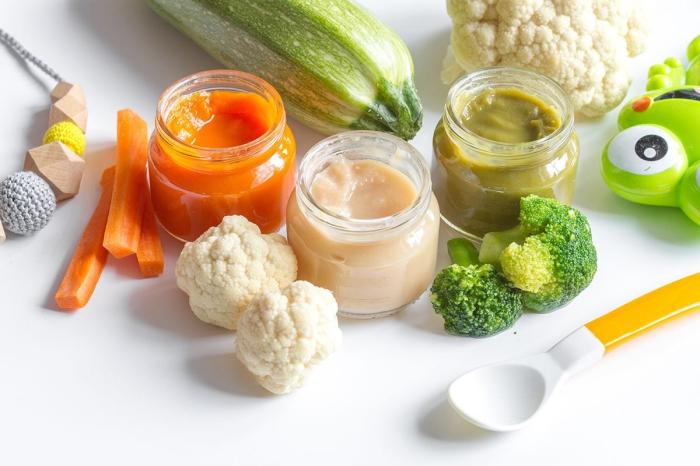A recent study conducted by researchers at Monash University has revealed alarming findings regarding ready-made baby and toddler foods available in Australian supermarkets. The study indicates that a significant portion of these products fails to meet the nutrient, labeling, and marketing standards established by the World Health Organization (WHO).
High Sugar Content in Commercial Baby Foods
The study, published in the journal Public Health Nutrition, found that 43% of the analyzed baby and toddler food products exceeded the recommended sugar limits set by WHO guidelines. Furthermore, only 23% of the foods specifically marketed for infants and toddlers met all nutrient content requirements as outlined by the WHO.
In 2023, the commercial baby food market in Australia generated over $370 million in revenue, highlighting the prevalence and popularity of these products among parents.
Lead author Dr. Alexandra Chung, from Monash University’s Department of Nutrition, Dietetics, and Food, expressed concern about the consumption patterns of Australian children. “One in two Australian children aged up to five years consumes commercial infant and toddler foods at least once a week,” she stated.
At the same time, the market for commercial baby foods is expanding rapidly, with new products consistently entering the grocery landscape. “Commercial infant and toddler foods represent a growing segment of the grocery market,” Chung noted.
Issues with Labeling and Promotion
In addition to high sugar levels, the study found that none of the 45 products assessed met the labeling or promotional requirements set by the WHO. Each of the products contained at least one marketing claim that did not comply with WHO guidelines.
The misleading marketing tactics give parents the impression that these products are healthy options for their children. In reality, many of these foods are high in sugar and lack the necessary variety of textures and flavors that young children require for healthy development.
The researchers focused on the compliance of commercial foods for infants and toddlers with the WHO Regional Office for Europe’s Nutrient and Promotion Profile Model (NPPM). This model aims to guide appropriate marketing of food products for infants and young children aged 6 to 36 months. The study examined a sample of 45 items available in Australian supermarkets.
Regulatory Oversight and Gaps
In Australia, food safety and labeling are governed by the Australia New Zealand Food Standards Code. This code sets compositional and labeling requirements for infant foods, including limits on sugar and sodium, minimum iron content in cereal-based products, and essential labeling requirements that indicate age recommendations and vitamin and mineral claims.
However, many of the health-related claims commonly found on infant and toddler foods are not adequately regulated under the Food Standards Code. “This includes claims that appeal to health and promote the product as suitable for young children, such as ‘natural,’ ‘organic,’ ‘no nasties,’ ‘no preservatives,’ and ‘for tiny hands’,” Dr. Chung explained.
She emphasized that there is a notable gap in the current regulations governing commercial foods for infants and toddlers. This gap allows manufacturers to influence children’s diets through the promotion of these products, often misleading parents about their nutritional value.
Government Consultation on Improving Infant Food Standards
The findings of this study come at a crucial time, as the Australian Government Department of Health and Aged Care has recently conducted a public consultation focused on improving the standards for commercial foods intended for infants and young children.
Dr. Chung believes that this consultation represents a significant opportunity for the government to introduce comprehensive, mandatory regulations that would improve the composition of these foods. “This is an important opportunity for the government to implement regulations that enhance the quality of commercial foods, ensuring accurate labeling and honest promotion to safeguard the health of Australia’s youngest children,” she stated.
Implications for Parents and Caregivers
The revelations from this study serve as a wake-up call for parents and caregivers regarding the nutritional quality of commercial baby foods. With many products on the market failing to meet health guidelines, it is crucial for families to be vigilant and informed about the foods they choose for their children.
Parents should carefully examine product labels, looking beyond appealing marketing claims. Choosing whole foods and preparing meals at home can provide children with healthier options that meet their nutritional needs.
Additionally, raising awareness about the importance of regulatory oversight in the food industry is essential. Advocacy for stricter regulations can help ensure that products marketed to children are safe, nutritious, and genuinely beneficial for their development.
Conclusion
The Monash University study underscores the urgent need for improved regulation and oversight of commercial baby and toddler foods in Australia. With a significant percentage of these products exceeding sugar limits and failing to meet WHO standards, it is essential for parents to remain informed and proactive in their choices.
As the market for commercial baby foods continues to grow, it is vital for regulatory bodies to take action to protect the health of Australia’s children. By implementing comprehensive regulations and ensuring accurate labeling and marketing, the government can play a crucial role in promoting healthier dietary choices for infants and toddlers.
In the meantime, parents are encouraged to prioritize nutrition by seeking out wholesome, homemade meals and being cautious of the claims made by commercial products. With increased awareness and advocacy for better standards, it is possible to ensure a healthier future for the next generation.
Related topics:


